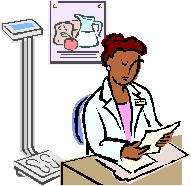MANAGEMENT
 The nutritional aspects of stress management are straightforward: you should be concerned with not only what you eat but also how much you eat.
The nutritional aspects of stress management are straightforward: you should be concerned with not only what you eat but also how much you eat.
Doing a better job of selecting what foods to eat doesn’t mean you must become a health-food faddist. You must be aware, though, that the quality of food bears directly on your health and the energy available for work. If your nutritional education needs sharpening, here is a reminder of the types of useful guidance you can find by studying nutritional literature:
· Fresh foods are the healthiest, frozen are the next best thing, and canned foods the least nutritious.
· Whole grains in breads, flour, and pastries contain all the natural nourishment of the grain. White flour is stripped of its food value when it is bleached.
· Sugar gives a burst of energy to the nervous system and then it takes a long time to replenish the energy. The result is quick up and long down.
· Dairy products have a congestive effect. They are mucus forming, which means they produce a substance to coat and protect areas of the body. This mucus layer can be useful in keeping the body warm in winter, but may be unnecessary in the warmer seasons. Pay attention to what dairy products do for you.
· A balanced diet contains a little bit of every food group. Don’t forget fresh fruits and vegetables. They are an excellent source of vitamins and minerals which are absolutely necessary for the proper functioning of your body.
· Some of the most nutritious foods of all are little known in our society. They include nutritional yeast, soy beans, miso, bean curd, sprouts, and seaweed. Consult your health food store for information as to their applications and benefits.
· Most important, remember everybody is different. So eat what feels good to you, not what you think, read, or hear should be good. Learn to trust your healthy self.
Before you eat, first consider whether or not you are hungry. If you are not hungry, chances are that your body does not need any food – don’t waste your time eating. If you are hungry, determine how much food it will take to satisfy your hunger. You must develop the ability to eat only until you know that you are no longer hungry. In short, as you eat, “think healthy” and ask yourself if you really need that food.
Include a program for food health in your life and you will notice differences in your being that affect work. You’ll be more aware of what’s going on around you. You’ll have a more consistent level of energy as you go through the day. You’ll have a greater sense of control over your life and more confidence in your work. You’ll be able to concentrate on those intellectual activities that will help you cope with the stresses of your job.
One more general thought. Use your time advantageously. “Balance” is all important. Balance work and relaxation for a truly healthier, less stressful life.
======================VOCABULARY===================
| be aware of | знать, сознавать |
| faddist, n | чудак |
| bear on, v | касаться, иметь отношение к |
| canned food | консервированные продукты питания |
| grain, n | зерно |
| flour, n | мука |
| pastry, n | кондитерские изделия |
| strip of, v | лишать (чего-либо), отнимать |
| food value | питательная ценность |
| bleach, v | отбеливать |
| replenish, v | пополнять |
| dairy products | молочные продукты |
| congestive effect | эффект перегрузки (застоя) |
| mucus, n | слизь |
| nutritional yeast | пищевые дрожжи |
| soy beans | соевые бобы |
| bean curd | соевый творог |
| sprouts, n | брюссельская капуста |
| seaweed, n | морская водоросль |
| nourishment, n | питание, пища, поддержка |
======================================================
I. Read the text ‘ A Nutritional Aspects of Stress Management’. Find the answers to the questions below:
1. What are the nutritional aspects of stress management?
2. What should you know to select what foods to eat?
3. What foods are the healthiest?
4. What is the role of sugar?
5. How do dairy products affect the human organism?
6. What does a balanced diet consist of?
7. What are the most nutritious foods?
8. What must one do in order to feel healthy and strong? Give recommendations.
9. What are your eating habits? Do you balance your food?
II. Read the text ‘ The Nutritional Aspects of Stress Management’ again. Find the English equivalents for the following words and phrases:
аспекты питания – простые; выбирая, какие продукты есть; чудак, помешанный на здоровой пище; оказывает непосредственное влияние на ваше здоровье; памятка (напоминание); полезное руководство; литература о питании; естественное питание (натуральное питание); быстрый подъем (взлет) и быстрый спуск (падение); согревая тело зимой; сбалансированная диета; каждая группа продуктов питания; для правильного функционирования вашего тела; не трать попусту свое время; вы больше не голодны; вы заметите разницу в своем состоянии; что происходит вокруг вас; более постоянный уровень энергии; в течение дня; уверенность в своей работе; используйте свое время рационально (с пользой);
III. Name at least 5 nutritious foods and 3 - 5 dairy products.
IV. Look through texts A and B. Write your recommendations how to cope with work stress.
V. Give a presentation of the problems posed in texts A and B.






